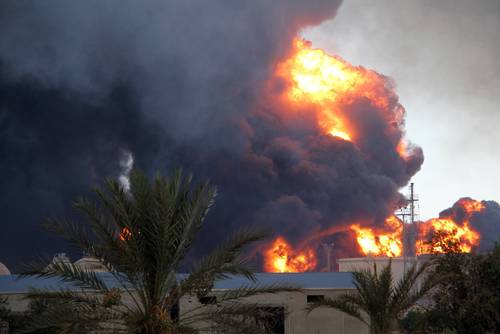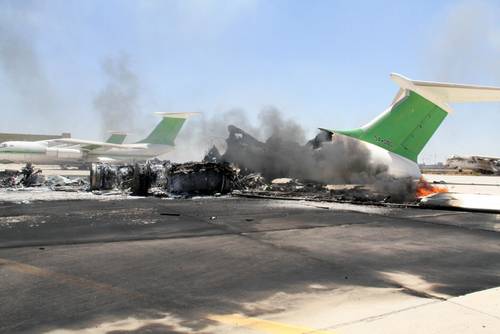
When retired Major General Khalifa Belqasem Haftar began his “Operation Dignity” earlier this year, provoking some cautious optimism from the international community, many experts retorted that it could not, in any case, get worse. Libya was in such disarray—a collapsing economy, a dysfunctional state dismembered by armed militias, political assassinations, smuggling of arms and drugs, etc.—that any action was seen as salutary.
Haftar, with his straight gray hair, elegant military dress full of decorations, soft voice, and fatherly look, was an appealing alternative to the bearded Islamists and younger hyperactive militiamen. His career in the army, experience in several wars, and years of exile in the United States added to his aura. For foreign observers and many Libyans, he was the man of the hour, the hope of Libya.
But, as North Africa enters its gloomiest fall since the Arab Spring began more than three years ago, Haftar’s “military coup” has definitely worsened the situation. The extremists he pledged to disband are now in control of most of Libya, the country itself is divided into (at least) two parts, and the economy continues to sink. Haftar is said to have escaped to neighbouring Egypt, the source of most of his support.
On 14 February 2014, General Haftar recorded a video claiming that he was taking over the country: it was an old fashioned coup. Warnings went out to the world’s governments, and breaking news filled TV screens. Minutes, hours, days later, there were no traces of Haftar in Libya’s capital or elsewhere. His move was nicknamed the “Television Coup”.
Haftar reappeared two months later, on 16 May, to announce the beginning of “Operation Dignity”. His discourse was nationalistic, security-oriented, and anti-Islamist; his language was religious, with a democratic façade. Haftar portrayed himself as Libya’s unifier and strongman but also as a North African hero waging a war on terror. He aimed to please both his discontented fellow citizens and the international community.
His military actions were limited at first to eastern Libya, around Benghazi, the stronghold of the Islamists. His headquarters were south of that city (attacked there by a suicide bomber in June, Hafter was slightly injured). After multiple attacks on the ground, the rogue general sent fighter jets to bomb Islamist bases. It became clear that he was getting support and supplies from Egypt, whose ruler, former field marshal Abdel Fattah al-Sisi, is Haftar’s role model.
Al-Sisi staged a coup in July 2013, following popular demonstrations against Islamist president Mohamed Morsi (elected in June 2012). He gave power to a (symbolic) caretaker government, coveting the presidential seat for himself. Elections were organized in May 2014, and he received 97% of the vote. He banned the Muslim Brotherhood and seems to have won the battle against them (for now). Yet Egypt turned back to authoritarian rule.
But al-Sisi’s model could not be emulated in Libya in the same way, while Haftar is almost a caricature of al-Sisi. Egypt was shaken by strikes and police repression in the last three years, while Libya went through civil war. Egypt has functioning institutions, Libya almost none. Egypt has a strong army that formed the backbone of the state for decades, if not centuries, while Libya’s army has always been weak and divided. Al-Sisi grew up in the ranks of the armed forces and never left the barracks, until heading the army (2012), while Haftar was disconnected from the troops for years. Al-Sisi is 59 years old, Haftar 71.
Hence, while Haftar called himself the head of the Libyan National Army, aiming to restore order and correct the trajectory of democracy, he was in fact referring to a group of soldiers (a few thousand) he gathered under his command, some out of conviction, others by being bribed. He did not have an army like al-Sisi’s. His area of action was concentrated around Benghazi, and his actions always limited in scale and results.
Yet Operation Dignity did achieve some goals. There was an armed attack against the parliament (then called the General National Congress, GNC) in Tripoli (in western Libya, closer to the Tunisian and Algerian borders), in May, which made it clear that Haftar’s action had supporters in the capital. The move accelerated political developments, and long-delayed elections were finally held on 25 June.
The population had had enough of the Islamists’ almost two-year rule, and they voted them out. The new parliament (House of Representatives, HR) was composed largely of nationalists and independents (close to the nationalists). The turnout, however, was low (18 percent), and many polling stations did not open on election day. The country was polarized; those in power did not want to accept the newcomers, and the newcomers wanted to exclude the old ones. A new zero-sum game was about to begin.
Islamists Fight Back

Refusing to accept their defeat and feeling that the newcomers would ally themselves with Haftar to fight them, the Islamists, mainly militias from Tripoli and Misrata, coalesced in what they called “Operation Libya Dawn” and strengthened their control of the capital, while attacking Tripoli International Airport (July). The latter was under the control of Zintan tribe, a Haftar-allied militia from western Libya. Other Islamists began a large-scale attack on Benghazi.
This fighting was the most intense since the end of 2011 civil war against Gaddafi. Most expatriates and diplomats left the country, while tens of thousands of refugees fled to Tunisia and Egypt. The number of casualties surpassed 1000, although there is no exact count of the injured. Schools have stopped functioning, and many commodities became scarce in the main cities.
By 17 August, Islamists had full control of Benghazi. Some were accused of storming the US embassy in September 2012 and killing Ambassador Christopher Stevens. A few days later, on 23 August, their allies in Tripoli were in control of the airport (several planes, aviation buildings, and oil tankers were damaged). It is unclear whether these Islamist militias will be willing to work with each other in the future, but they waged the war united. Haftar had lost the first round of his Operation Dignity.
Now Tripoli, Misrata, and Benghazi, Libya’s three main cities, are under Islamist control (the GNC was re-established). The HR moved to the easternmost region, Tobruk, apparently under the protection of Egypt, forming a buffer zone between the latter and “Islamist Libya”. Other armed militias control parts of northern, western, and southern Libya. Foreign powers (including Egypt, the United Arab Emirates, and the United States) are conducting occasional limited military raids in the country, but there is no end in sight.
Libya is more divided and more fragile, than ever.


